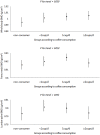The Benefit of Bone Health by Drinking Coffee among Korean Postmenopausal Women: A Cross-Sectional Analysis of the Fourth & Fifth Korea National Health and Nutrition Examination Surveys
- PMID: 26816211
- PMCID: PMC4729688
- DOI: 10.1371/journal.pone.0147762
The Benefit of Bone Health by Drinking Coffee among Korean Postmenopausal Women: A Cross-Sectional Analysis of the Fourth & Fifth Korea National Health and Nutrition Examination Surveys
Abstract
Purpose: Although the concern about coffee-associated health problems is increasing, the effect of coffee on osteoporosis is still conflicting. This study aimed to determine the relationship between coffee consumption and bone health in Korean postmenopausal women.
Methods: A population-based, cross-sectional study was performed using a nationally representative sample of the Korean general population. All 4,066 postmenopausal women (mean age 62.6 years) from the fourth and fifth Korean National Health and Nutrition Examination Survey (2008-2011), who completed the questionnaire about coffee consumption and had data of dual-energy X-ray absorptiometry (DXA) examination. Bone mineral density (BMD) was measured using DXA at the femoral neck and lumbar spine and osteoporosis was defined by World Health Organization T-score criteria in addition to self-report of current anti-osteoporotic medication use.
Results: After adjusting for various demographic and lifestyle confounders (including hormonal factors), subjects in the highest quartile of coffee intake had 36% lower odds for osteoporosis compared to those in the lowest quartile (Adjusted odds ratio [aOR] = 0.64; 95% confidence interval [CI], 0.43-0.95; P for trend = 0.015). This trend was consistent in osteoporosis of lumbar spine and femoral neck (aOR = 0.65 and 0.55; P for trend = 0.026 and 0.003, respectively). In addition, age- and body mass index (BMI)-adjusted BMD of the femoral neck and lumbar spine increased with higher coffee intake (P for trend = 0.019 and 0.051, respectively).
Conclusions: Coffee consumption may have protective benefits on bone health in Korean postmenopausal women in moderate amount. Further, prospective studies are required to confirm this association.
Conflict of interest statement
Figures


Similar articles
-
Relationship between bone mineral density and alcohol consumption in Korean men: the Fourth Korea National Health and Nutrition Examination Survey (KNHANES), 2008-2009.Asia Pac J Clin Nutr. 2016;25(2):308-15. doi: 10.6133/apjcn.2016.25.2.17. Asia Pac J Clin Nutr. 2016. PMID: 27222414
-
Association between Dietary Carotenoid Intake and Bone Mineral Density in Korean Adults Aged 30-75 Years Using Data from the Fourth and Fifth Korean National Health and Nutrition Examination Surveys (2008-2011).Nutrients. 2017 Sep 16;9(9):1025. doi: 10.3390/nu9091025. Nutrients. 2017. PMID: 28926945 Free PMC article.
-
Association between alcohol consumption and bone mineral density in elderly Korean men and women.Arch Osteoporos. 2018 Apr 25;13(1):46. doi: 10.1007/s11657-018-0462-4. Arch Osteoporos. 2018. PMID: 29696513
-
Relationship of homocysteine levels with lumbar spine and femur neck BMD in postmenopausal women.Acta Reumatol Port. 2015 Oct-Dec;40(4):355-62. Acta Reumatol Port. 2015. PMID: 26922199 Review.
-
Effects of dairy products on bone mineral density in healthy postmenopausal women: a systematic review and meta-analysis of randomized controlled trials.Arch Osteoporos. 2020 Mar 18;15(1):48. doi: 10.1007/s11657-020-0694-y. Arch Osteoporos. 2020. PMID: 32185512
Cited by
-
Does coffee drinking have beneficial effects on bone health of Taiwanese adults? A longitudinal study.BMC Public Health. 2018 Nov 20;18(1):1273. doi: 10.1186/s12889-018-6168-0. BMC Public Health. 2018. PMID: 30453911 Free PMC article.
-
Knowledge, Beliefs, Dietary, and Lifestyle Practices Related to Bone Health among Middle-Aged and Elderly Chinese in Klang Valley, Malaysia.Int J Environ Res Public Health. 2019 May 20;16(10):1787. doi: 10.3390/ijerph16101787. Int J Environ Res Public Health. 2019. PMID: 31137586 Free PMC article.
-
Role of lifestyle factors in mediating the effect of educational attainment on bone mineral density: a Mendelian randomization study.Arch Osteoporos. 2023 Sep 19;18(1):120. doi: 10.1007/s11657-023-01329-4. Arch Osteoporos. 2023. PMID: 37723362
-
Alcohol Consumption Moderated the Association Between Levels of High Blood Lead or Total Urinary Arsenic and Bone Loss.Front Endocrinol (Lausanne). 2021 Dec 3;12:782174. doi: 10.3389/fendo.2021.782174. eCollection 2021. Front Endocrinol (Lausanne). 2021. PMID: 34925242 Free PMC article.
-
Lack of Influence of Thyroid Hormone on Bone Mineral Density and Body Composition in Healthy Euthyroid Women.Front Endocrinol (Lausanne). 2020 Jan 10;10:890. doi: 10.3389/fendo.2019.00890. eCollection 2019. Front Endocrinol (Lausanne). 2020. PMID: 31998231 Free PMC article.
References
-
- Massey LK, Whiting SJ. Caffeine, Urinary Calcium, Calcium-Metabolism and Bone. J Nutr. 1993;123(9):1611–4. - PubMed
-
- United States Department of Agriculture. Coffee: World Markets and Trade. 2013 [updated Dec 13, 2013; Accessed 23 May 2014]. Available: http://usda.mannlib.cornell.edu/MannUsda/viewDocumentInfo.do?documentID=....
-
- Ross GW, Abbott RD, Petrovitch H, Morens DM, Grandinetti A, Tung KH, et al. Association of coffee and caffeine intake with the risk of Parkinson disease. J Am Med Assoc. 2000;283(20):2674–9. - PubMed
-
- Gallus S, Tavani A, Negri E, La Vecchia C. Does coffee protect against liver cirrhosis? Ann Epidemiol. 2002;12(3):202–5. - PubMed
MeSH terms
Substances
LinkOut - more resources
Full Text Sources
Other Literature Sources
Medical

